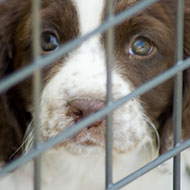
Association appeals to government to reexamine the evidence
Following the Government’s response to the Efra Select Committee report on tackling illegal puppy smuggling, the British Veterinary Association (BVA) has reiterated its call for tighter restrictions on pet travel and improved disease controls.
Defra minister Zac Goldsmith has written to the Committee answering a series of questions and recommendations on strengthening rules. The Efra Committee praised Defra’s new ‘Petfished’ campaign but expressed concerns that some of the recommendations have not been taken into account.
In its submissions to the Efra enquiry, the BVA called for a raise on the minimum age requirement for puppy travel from 15 weeks to six months. The Association said this would lessen the chance of puppies arriving into the UK at a saleable age.
Lord Goldsmith stated in his response, however, that the Government “has no immediate plans” to change its recommendations on pet travel.
Commenting, BVA president Daniella Dos Santos said: “This is such a missed opportunity for meaningful action to clamp down illegal puppy smuggling and improve disease controls. It’s far too easy for organised criminals to bring puppies into the UK for sale by abusing the current pet travel controls.
“EU Exit has provided an opportunity to strengthen our rules and only allow puppies to enter the UK at an age where they can no longer be advertised as cute puppies. It’s deeply disappointing that Defra isn’t considering taking this action."
She continued: “Vets see the heartache that can result from poorly bred and badly socialised puppies being illegally imported and sold to unsuspecting families. Awareness campaigns are important and useful but we also need strong regulatory measures that will stop the problem coming into the country. We’re appealing to the Government to look again at the evidence.”



 The Veterinary Medicines Directorate (VMD) is inviting applications from veterinary students to attend a one-week extramural studies (EMS) placement in July 2026.
The Veterinary Medicines Directorate (VMD) is inviting applications from veterinary students to attend a one-week extramural studies (EMS) placement in July 2026.